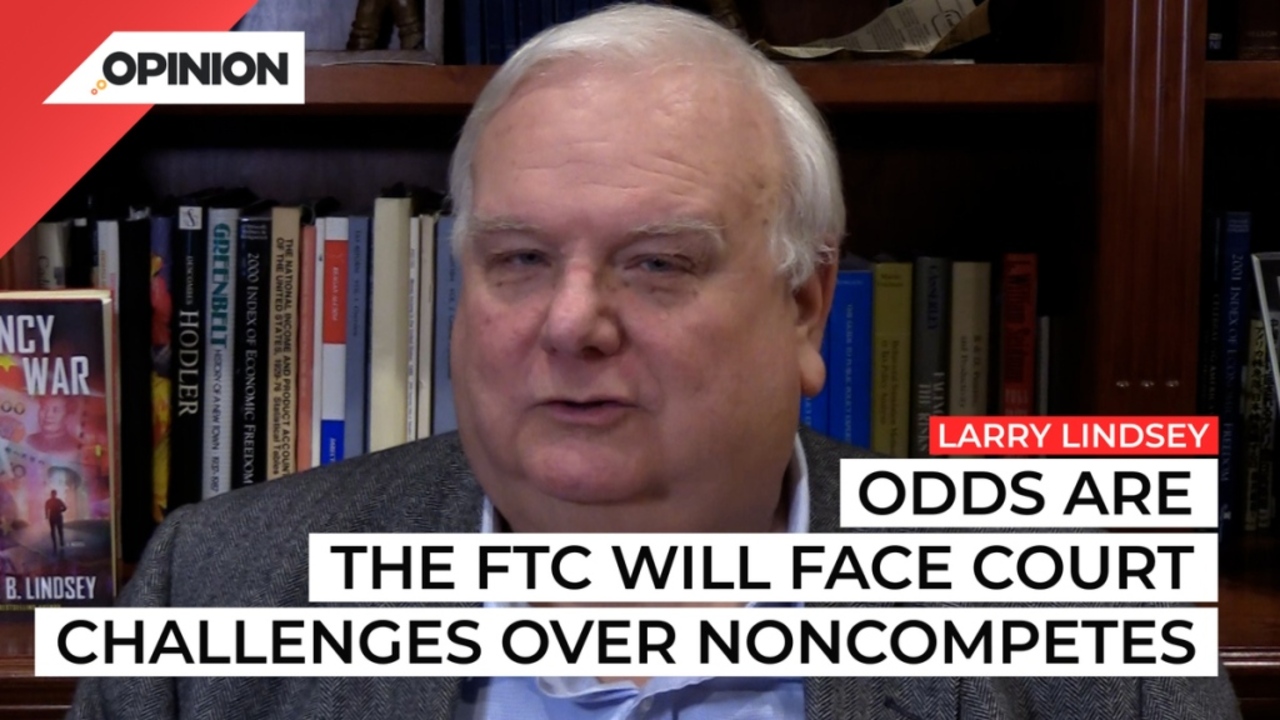
Commentary
-
Our commentary partners will help you reach your own conclusions on complex topics.
American labor markets have something in them called noncompetes, which stops people from jumping from one job to the next. Now, that may seem a little bit harsh to the worker, but it may make a little bit more sense once we think it through. They are similar to something called nondisclosure, where if you do go to another employer, you can’t talk about what you did at your previous employer.
Now, a lot of people are involved in this. Roughly 30 million American workers, 20% of the workforce, works under a non-compete clause in their contract. The Federal Trade Commission has decided that it wants to abolish noncompetes in America. They’re following a Biden executive order from July of 2021 that calls for ending all provisions that unfairly limit a worker’s mobility. Well, that sounds like a worthy goal. But let’s think about it a little bit further.
First of all, if the FTC adopts its proposal, it’s going to favor big, dominant firms over smaller firms. Why? Because a big dominant firm can simply poach from other firms, poach employees, particularly its suppliers.
During the recent pandemic and shortages of workers, the last firms to really worry about getting qualified workers were the big boys. After all, it’s probably more prestigious to work for a brand-name company than a small supplier. And so it’s easier for the big guys to just simply get the workers they need by getting them from their suppliers. Well, that makes it hard for the suppliers. It also lowers the chance that you’re going to have a lot of competition, since the big guys have a big advantage if the little guys can’t protect their workforce from being poached.
The second big issue is, invest in workers. Now, if I know that I have a worker who can walk across the street at any time to my competitor and blab about everything we’re doing at my firm, how likely am I to invest in that worker to let them in on the secrets, let them see how the office is actually run, how the company has actually run? Not very.
And the reason for noncompetes and also nondisclosures is exactly that. If you, the employer taking someone on and you want them to be a full part of your mission, then you really can’t trust them fully if they can simply be bought out or hired by your competitor. A related problem is investment in human capital. Most workers aren’t paid just for their time, their sweated labor, so to speak. They’re paid because of skills. And when people go to work, they add to those skills.
But adding to the skills isn’t free to the employer. They’re more likely to increase workers’ skills if they have some confidence the worker isn’t just going to get up and quit on them. And that’s another reason for noncompetes.
In addition, workers do have some say in this that there’s not imposed on them. They sign up for a contract. And if I have a lot of human capital, I’m going to demand my employer pay me for that. I’m going to have actually more power at the negotiating table, if my employer knows that I’m not going to go across the street. So it’s unclear that what the FTC is proposing is actually going to raise people’s wages.
Now under current law, things are done on a case by case basis. And they’re generally done by state courts, not by the appointed regulators in Washington. So whatever the FTC chooses to do, the odds are it’s going to face a lot of court challenges. There is no legislation that explicitly grants the FTC the power to do this. And recently, the courts have decided that it’s better to make decisions in state legislatures, which are elected, than by appointed, unelected regulators.
We’ll see how it all works out, but I think the idea that ending noncompetes is going to be good for workers is something the FTC really needs to think through again.
-
Election 2024 will boil down to the Great Lakes states
Pollsters and pundits have been engaged in a long debate about how Biden or Trump might win the 2024 election, with much of their focus spent on the “swing state” electoral battlegrounds. While the winners of Alabama or California may be obvious, for instance, who wins Pennsylvania is a more difficult question. Watch the above…
-
Why the Fed should consider Theory of Reflexivity when fixing policy
The Theory of Reflexivity, often used in the context of economics and financial markets, implies that investors don’t base their decisions on reality but on their perceptions of reality. This creates a feedback loop where investors’ perceptions influence economic fundamentals, which in turn alter investor perceptions. Watch the above video as Straight Arrow News contributor…
-
Federal Reserve surpassed its own wildest expectations
On May 14, the U.S. Bureau of Labor Statistics released the most current producer price index (PPI) report, which showed an increase of 0.5% month-over-month in April. After the report’s release, U.S. Federal Reserve chairman Jerome “Jay” Powell said that while he believes the current policy rate is restrictive by many measures, the Fed needs…
-
Polls give slight advantage to Trump in Electoral College
With the U.S. general election only six months away, leading candidates President Joe Biden and former President Donald Trump appear to be engaged in a very close contest. In their 2020 race, the winner of the Electoral College was ultimately determined by a relative handful of voters in just a few swing states, even though…
-
College sports is big money but not everyone benefits
March Madness has wrapped up and Caitlin Clark has emerged as a household name as well as a wealthy student athlete. Earning over $3 million throughout her college career, her success stands in stark contrast to the previous notion that collegiate athletes shouldn’t earn anything beyond their scholarship. Straight Arrow News contributor Larry Lindsey examines…
Latest Opinions
-
 U.S. Department of Defense
U.S. Department of Defense
Congress still trying to figure out how to reduce wasteful military spending
-
 DVIDS
DVIDS
US Navy, Air Force making waves with new weapons at RIMPAC
-
 Getty Images
Getty Images
Israeli PM Netanyahu meets with Trump at Mar-a-Lago
-
 Getty Images
Getty Images
Growing US nuclear power resurgence reaches the nation’s heartland
-
 Getty Images
Getty Images
Beer from the sun, other solar thermal projects get government funding
Popular Opinions
-
In addition to the facts, we believe it’s vital to hear perspectives from all sides of the political spectrum.


